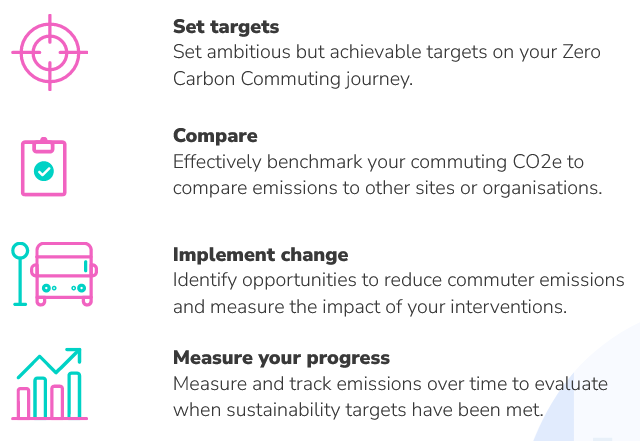Posted by Janet B. Stroud — October 2, 2023 — A new study of facilities managers (FMs) working for large UK companies employing more than 500 staff found that 74% of their firms had already started reducing greenhouse gas (GHG) emissions linked to employees’ commutes to and from their workplaces.

Mobilityways’ Travel Survey helps companies understand how their team currently commutes to work so they can monitor and track the success of behavioral change initiatives. Image courtesy Mobilityways
Looking deeper at the research, conducted by climate tech provider Mobilityways, 71% of facilities managers were already collecting data on the modes of transport which employees use in their commutes to work, and over half (53%) already know the average distance each employee commutes in a typical working week. A further 9% plan to start collecting this sort of data before the end of this year.
The same study found that facilities managers were highly active in the race to make both working practices and workplaces themselves more sustainable. For example, more than half (52%) of them confirmed that they already see primary data on emissions generated by business travel.
Nearly half, 45%, see emissions data linked to waste generated in the operation of their firm; 43% already have sight of primary emissions data associated with purchased goods and services, and the same percentage could view emissions data associated with upstream transportation and distribution.
Of the facilities managers that had already started sustainability-driven
Finally, 44% had brought in an outside data/service provider to help them gather employee travel emissions data and help stimulate staff to explore greener travel alternatives for lower-carbon commutes.

Mobilityways offers technology and resources to encourage lower-carbon commutes. Image courtesy Mobilityways
However, despite facility managers driving these sustainability-driven changes, many still have concerns about the accuracy and transparency of their employers’ emissions reports for key categories detailed in Scope 1, 2 and 3 emissions reporting. For example, only 48% of FMs felt emissions data from waste generated in operations was accurate and complete enough. Only 42% felt they had accurate numbers for emissions from purchased goods and services, and 39% felt that they had accurate emissions numbers from both employee commuting and capital goods.
Scope 3 environmental reporting is focused on collecting emissions from companies’ suppliers in their “value chain” including those supplying power and equipment into companies’ office buildings and manufacturing facilities.
FMs took the view that, on average, 44% of total GHG emissions of their firms were coming from indirect upstream and downstream Scope 3 emissions. By contrast, transport and corporate fleet management senior decision-makers estimated that Scope 3 category emissions were responsible for just 33% of total emissions.
This finding verifies that, from all decision-makers questioned1 for this study, facilities managers come closest to an accurate understanding of the importance of tackling Scope 3 emissions levels, as emissions reporting specialists estimate that Scope 3 emissions are in fact likely to be responsible for at least 70% of a typical corporate’s total emissions.
According to industry analyst Frost & Sullivan, 40% of CO2 emissions, 50% of electricity consumption, and 35% of waste production comes from our places of work, so perhaps it is not surprising that FMs are front and center in the struggle to reduce emissions across every aspect of work, as well as across all corporate buildings.
Julie Furnell, managing director of Mobilityways, commented:
Facilities managers have been right at the forefront of seismic changes in working practices and behaviors during and immediately post-pandemic. Many have been involved in the right-sizing and re-designing of workplaces to fit the new hybrid-dominated work patterns.
They’ve led the reinvention of workplaces to ensure office buildings are smarter, more energy efficient and higher performing; whilst simultaneously making sure the experience they offer staff and visitors is both more comfortable and healthier — promoting higher productivity by doing so. Naturally, they’ve had to lead on application of new building management systems and other proptech solutions to help optimize the use of these new workplaces.
Their work has naturally extended from enabling smart and sustainable buildings to ensuring staff can explore and select less carbon-intensive ways of traveling into those offices. In this way, offices throughout the UK can hope to increase occupancy levels post-pandemic without increasing their Scope 3 emissions output simultaneously.
Visit Mobilityways to find out more about its mission to make zero carbon commuting a reality. Powered by ACEL (Average Commuter Emissions Level) methodology, the Mobilityways Platform empowers employers to measure, reduce and report commuter emissions.




